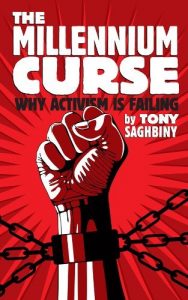 I suspect that reading Tony Saghbiny's book The Millennium Curse: Why Activism is Failing might be a disturbing experience for you. It was for me.
I suspect that reading Tony Saghbiny's book The Millennium Curse: Why Activism is Failing might be a disturbing experience for you. It was for me.
If you consider yourself an activist in any form, there's a good chance that the book will challenge some aspect of the way you think about what kinds of activism are useful and effective. If you're proud of the successful Facebook or Twitter campaigns you've orchestrated to raise awareness about a certain issue, you'll probably be made uncomfortable. If you have invested heavily in becoming the change you wish to see in the world, you might feel insulted or deflated. If you think of yourself as a pacifist, you might feel like hitting something. And if you're pretty content with the status quo, or if you're not someone who appreciates activism in any form, it might be upsetting to think about the very existence of such a book, let alone some of its implications.
The Millennium Curse tackles head on the question of why much of modern activism is proving itself to be largely ineffective.

